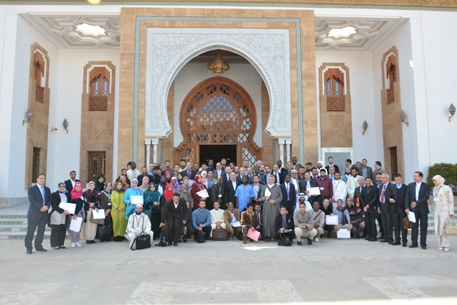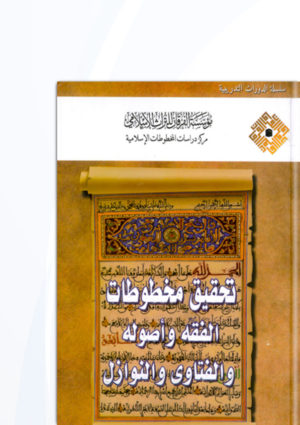In the context of its cultural and scientific activities, Al-Furqān Islamic Heritage Foundation organised a training course on critical editing titled “Editing Manuscripts on Jurisprudence, Legal Theory, Fatwās, and Momentous Events (al-Nawāzil)”, in collaboration with the Dar al-Hadith al-Hassania Institute.
The body of lecturers at the training course was highly qualified, including Dr Bashar Awwad Marouf, Dr Mohammed al-Rougui, Dr Abdul Rahman Rashid al-Haqan and others.
The course was attended by 85 delegates, comprising highly skilled and academically qualified researchers, representatives of several research centres, masters and doctoral degree students, as well as other interested individuals, from Morocco and beyond.
The training course took place from 6-11 April 2015, and was held on the premises of Dar al-Hadith al-Hassania Institute in Rabat.
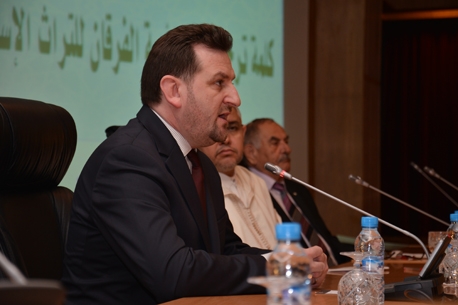
The course aimed principally to develop the awareness and enthusiasm of the participants on the importance of the Islamic written heritage, in general, and the heritage in the area of jurisprudence, in particular. In addition, the course was designed to equip the younger generation with the proper tools to embark on the critical editing of this heritage, by presenting an appropriate summary of the main steps of critical editing in the domains of jurisprudence, legal theory, fatwās, and momentous events (al-nawāzil), in both theory and practice. The course covered all areas of the editor’s job: at the theoretical level, it discussed the scientific concepts, principles, history, approaches, and problems of critical editing, as well as signposting the essential sources that must be consulted; at the level of practice, the course examined the proper choice and documentation of the text to be edited, the search and study of exemplars, exploring the text’s tradition, the process of transcription and collation, text emendation and treatment, commentary, investigation, etc. These were addressed in specialised workshops, where the delegates were exposed directly to examples of manuscript copies related to the course topic.
This highly beneficial course was launched with the screening of a short documentary about Al-Furqān Islamic Heritage Foundation and its Centre for the Study of Islamic Manuscripts. This was followed by welcoming speeches by organisers and participants, led by Dr Abdul Hamid Achak, the Deputy Director of Dar al-Hadith al-Hassania Institute, then Mr Sali Shahsivari, the Managing Director of Al-Furqān Islamic Heritage Foundation, and finally, Dr Bashar Awwad Marouf, in the name of the team of lecturers at this training course.
Following this opening ceremony and the reception held in honour of guests and delegates, the participants attended the first lecture, titled “Approaches to editing Fiqhmanuscripts: al-Muḥallā by Ibn Ḥazm as an example” delivered by Dr Bashar Awwad Marouf. He began the lecture by giving a brief definition of the term “editing” from the perspective of practitioners of the art, saying: "it is to arrive at the correct text, which exactly matches what the author had written, and was satisfied with at the end of his life; documenting the text in terms of attribution and content, and taking care in amending it to reveal the meanings intended by the author". He then moved to speaking about the rules of editing, pointing out that the editor must distinguish between what he called the common general rules, which everyone must abide by, and cannot disregard and the special rules, which relate to the specific nature of some books. His introduction included the criteria relating to the editor specifically; for example, to possess full knowledge of the text's subject.
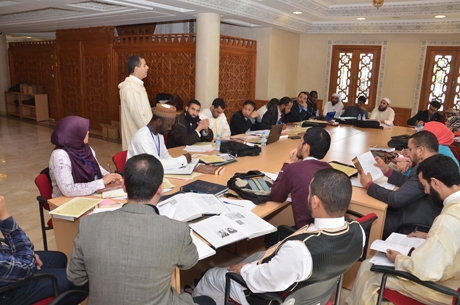
The lecture by Dr Abdul Rahman Rashid al-Haqan, "Requirements of the editor of Mālikī heritage", contained an introduction to two areas of study. The introduction focused on the Islamic heritage and its spiritual and scientific value to the Muslim nation. The lecturer then proceeded to explain some terms, which he used in the title of his lecture, especially the term “editing” and the most renowned works authored in this field. As for the first area of study, he talked of the necessity of fully apprehending the culture of the area in which the editor works; indeed, if it was the Mālikī school of jurisprudence, then he cannot be pardoned for being ignorant of the personality of the founding Imam, his most prominent students, the most renowned scholars of the school, the key reference works and texts branching thereof, as well as acquiring juristic knowledge in the majority of issues of this school’s jurisprudence as revealed by eminent authorities and experts. As for the second area of study, he spoke about tools that support the editor, namely knowledge of the sources of information, solid grounding in calligraphy and scripts and their phases of development, knowledge of the fundamentals of this school of jurisprudence, and its branches, terminology, and eminent personalities. The papers that were presented in this training course revolved around the principles of comparing exemplars, the difficulties and problems of editing books on jurisprudence, causation at the decision point of weighing up alternatives, methodological steps in the service of the edited jurisprudence text, rules for commentary, the importance of indices (kashafāt) indexing edited books, a lecture on the rare manuscripts in jurisprudence and legal theory in the holdings of Khizānat Ibn Yūsuf in Marrakech, the formulation of fatwāsbased on the Maghribī books on momentous events (al-nawāzil), and mistakes and their categories in the editing of manuscripts on legal theory (uṣūl al-fiqh).
The eight practical sessions addressed the standards for choosing texts to be subjected to editing, collecting manuscript copies and the approach to their study, manuscript reading, exploring the script and symbols, transcription, emendation, collation, the creation of glosses and commentaries, introduction and investigation, authenticating the attribution of the book to its author and verifying its title, creating indices, including terms and bibliographies, and more.
The training course concluded with an open session with a group of lecturers. This was an opportunity for a general discussion, where lecturers responded to some general and technical questions on the topic of editing. Dr Rachid Qabadh spoke on behalf of the participants in the training course, and praised both the Dar al-Hadith al-Hassania Institute and Al-Furqān Islamic Heritage Foundation for their role in preserving the treasures represented by manuscripts, books, and rare items, publishing this heritage and granting researchers access, as well as equipping them with skills and knowledge. He spoke highly of the course programme, in marrying theory with practise, and in the good choice of course lecturers; he described the huge impact of this training course in developing a new awareness of the world of manuscript for some, and in enhancing the expertise of others; this was the most important achievement of the course. He also praised the good organisation, where the organisers had made available all the materials needed. The lecturers were similarly impressed, praising the good quality and choice of subjects, and the design of the programme, which reflected a knowledgeable approach, and a wise selection of course leaders and participants.
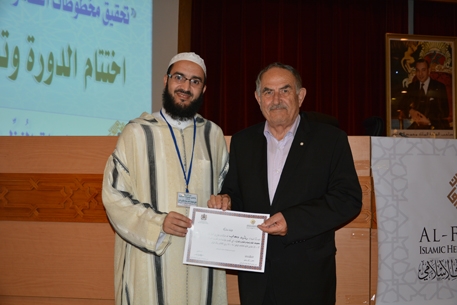
The closing speech was given by Dr Ahmad al-Khamlichi, the Director of the Dar al-Hadith al-Hassania Institute, who expressed his pleasure at the success of the course, and emphasised the strengthened relationship between the two organisations, and how this had begun to bear fruit, with the results apparent in the outcomes enjoyed by researchers. On his part, Mr Sali Shahsivari, Managing Director of Al-Furqān Foundation, thanked the Dar al-Hadith al-Hassania Institute, represented by its Director, Dr Ahmad al-Khamlichi, and Deputy-Director, Dr Abdul Hamid Achaq, and all its professors, employees, and students, for their generous hospitality, exceptional care, and engaging welcome. He praised the co-operation with this outstanding organisation, and thanked the participants, lecturers and organisers of the training course. At the end, certificates were granted to students, lecturers and organisers.
